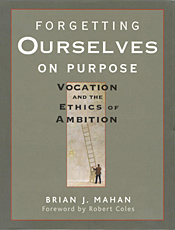Brian Mahan is a Catholic layperson who teaches at Emory University's Candler School of Theology. This ethical consideration of vocation and the ethics of ambition grew out of a course he taught to undergraduates at the University of Colorado, Boulder, for nearly a decade. In his laudatory introduction, Robert Coles praises Mahan for providing "moral companionship" to those who are interested in serious soul-searching.
American culture is obsessed with growth and mastery. This in itself is a good thing. But when the sole purpose of ambition becomes success at the expense of treating others with respect, the game turns sour. Even worse, those who daily strive for self-glory have lost sight of the medicinal qualities of failure.
Mahan challenges us to mine the meanings of vocation, quoting Frederick Buechner's beautiful definition: "The place God calls you to is a place where your deepest gladness and the world's deep hunger meet." Lucky are those whose highest desires and unique God-given talents are melded together in service of others. Using illustrative material from William James, John Dean, Walker Percy, Leo Tolstoy, and others, the author comes up with plenty of material that will spur self-examination, especially in regard to the tug and pull between personal ambition and spirituality.
At the core of this soul-searching work of cultural criticism is Mahan's examination of what Thomas Merton called "a life given over to self-forgetfulness." This, of course, goes against the grain of the American mythology of success. But it is a spiritual option that seems more needed than ever in an era of spiraling selfishness.
